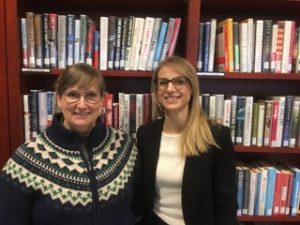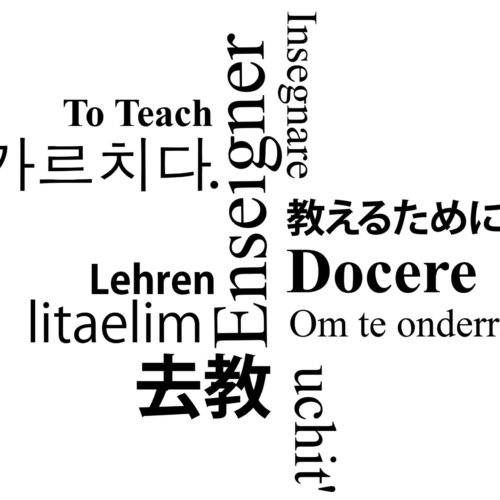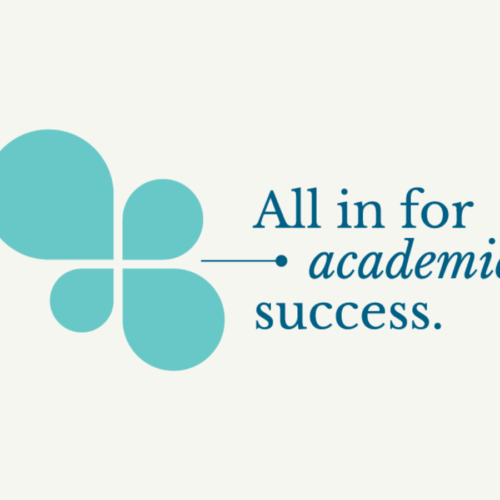Prison Education Project Leaders Discuss Inclusive Teaching and Research

“It will only make us better teachers to look at issues in different ways, and that can happen if we engage with students with different life experiences from our own,” said Jennifer Hudson, Ph.D., political science faculty member and former Prison Education Project Manager and Academic Advisor for the Prison Education Project at Washington University in St. Louis. Hudson and her colleague Kristine Helbling, a subject librarian and instruction coordinator at Washington University in St. Louis, work together on a for-credit class, “Research in the Contemporary Academic Library,” which trains undergraduate students at Wash U to help prison students with research.
Hudson is a political theorist and lecturer in the Department of Political Science by courtesy at Washington University in St. Louis. She received her PhD in Political Science from Columbia University in 2016. Before assuming her role as project manager of the Prison Education Project, she had a postdoctoral fellowship at the Hannah Arendt Center for Politics at Humanities at Bard College and the Bard Prison Initiative (BPI).
Helbling teaches a University College course, “Mastering Research in Today’s Academic Library,” and supports numerous writing programs on campus in addition to coordinating the Prison Education Project Research Partnership.
In an interview with The Teaching Center, Hudson and Helbling discuss the importance of prison education and the benefits of having undergraduate students and prison students work together to complete coursework and develop academic skills.
How did the Prison Education Project come about at Washington University?
Hudson: The main faculty member who created it is Maggie Garb, who sadly passed away last year, and she invited Rob Henke to join her as co-director. She was consulting with Daniel Karpowitz (Director of Policy and Academics for the Bard Prison Initiative and author of College in Prison: Reading in an Age of Mass Incarceration), who I worked with when I was a postdoc at Bard. Wash U was initially offering two classes in prison, and Daniel recommended that Maggie and Rob recruit a PhD with experience in higher ed in prison to expand the program while maintaining its academic rigor. Daniel then recruited me to come to Wash U.
In fall 2017, Joe Loewenstein (Professor in the Department of English, Director of the Humanities Digital Workshop and the Interdisciplinary Project in the Humanities, and PEP Faculty Advisory Board member) offered to reach out to the library to discuss adding research possibilities to the project. This was the beginning of the partnership between PEP and the library.
How has library played a role in expanding the program at Wash U?
Hudson: Undergraduates can take a for-credit class, the “Prison Education Project Research Partnership,” through which they can help prison students find research sources to support both their coursework and general intellectual curiosity. It’s a way of getting Danforth Campus students involved that isn’t community service, so main campus and incarcerated students are equal and working together. The campus students get serious research training in the course.
I was just able, last August, to get a computer lab set up inside the prison that was designed by Arts & Sciences Computing. We bought a relatively large server to store digital resource materials. We’ve only been able to get a JSTOR index with only the abstracts of articles so far, but that will hopefully allow students in the prison to do some of their own research and submit more detailed research requests to the class.
Helbling: It will also get them ready for research in the 21st century. Depending on how long they’ve been in prison, they haven’t done research before or in a while. It’s a way to give them a leg up or a parallel opportunity for when they come up for release.
What is involved in the Prison Education Project Research Partnership course?
Helbling: There are eight Wash U undergrads enrolled in the class this semester. They’re a diverse group comprised of freshmen and seniors with different majors. A lot of professors who teach a class at Wash U and at the prison encourage their Danforth Campus students to take this class and help out. We encourage prison students to ask questions in various ways, and it’s helpful for the Danforth Campus students to be able to do research in multiple ways. Evaluating sources is a big part of that. It’s easy to find information so source evaluation is a critical skill.
Hudson: The point is to get students to be more reflective about not just accessing information but figuring out how research is produced, and which questions count as valid in different disciplines. I try to grab different kinds of studies and sources to show undergraduate students how the same topic can be studied from multiple points of view, using different approaches.
At the end of the class, they write their own paper on a topic of their choosing and they have to look at it through at least two different disciplinary lenses. Their other final project is a portfolio of their research exchanges and reflections about how they’ve grown as a researcher.
How does the academic side of the Prison Education Project work?
Hudson: It begins with competitive admission. About 70 people apply every year and we accept around 10. Acceptance is not based on previous grades, but on interviews and an essay that we score. The courses that we offer are often taught by senior faculty. Faculty will often teach two sections of the same class in the same semester, one on the Danforth Campus and one in the prison. Once a semester, a teacher can hold a joint class with students from both sections.
I’ve also worked with the Provost’s office to get accreditation so incarcerated students, who register through University College, can complete an associate’s degree. Our first graduation is May 22, 2019 and there are eight people graduating. We’d like to flesh out the program and help students get a bachelor’s degree, but to do so we would have to double the student size and recruit more faculty to teach additional courses.
Why do you think it’s important to have this kind of program at universities?
Hudson: Mass incarceration is one of the defining problems of our time, and this is one way as a university that we can think about that problem. There’s an interesting dynamic when you have campus students, faculty, and incarcerated students working together, and it creates a good basis on which to start thinking about the problem differently.
It’s also an experiment in higher education. We’re transposing Washington University onto the prison and we’re trying to create equal opportunities. It’s never going to be like campus, but that’s actually good and interesting because it forces you to strip down university education to its roots, which is academics.
What advice do you have for aspiring teachers?
Hudson: You always become a better teacher by putting yourself in different situations where you have to adapt and be empathetic. At the same time, you should stay focused on what’s important to you. I didn’t overthink how my experience teaching in prison would be different. I was teaching to teach while taking into account the ways I needed to be flexible.
It’s a shame that the people who are doing most of the high-level teaching and research in this country are only in contact with a small proportion of people in the population. It will only make us better teachers to look at issues in different ways, and that can happen if we engage with students with different life experiences from our own.
How can people on Wash U’s campus get more involved with the Prison Education Project?
Hudson: They should reach out to Rob Henke or other members of the executive committee including David Cunningham (Professor of Sociology), Jami Ake (Assistant Dean, College of Arts & Sciences; Senior Lecturer, Interdisciplinary Projects in the Humanities), Barbara Baumgartner (Associate Director of the Prison Education Project, Senior Lecturer in Women, Gender, and Sexuality Studies, and Director of Undergraduate Studies), and Lerone Martin (Associate Professor in Religion and Politics at the John C. Danforth Center on Religion and Politics). They can also contact me.
Students can get involved through the research class. PEP also hires a certain number of student workers per year. They can reach out to the executive committee about those opportunities.




